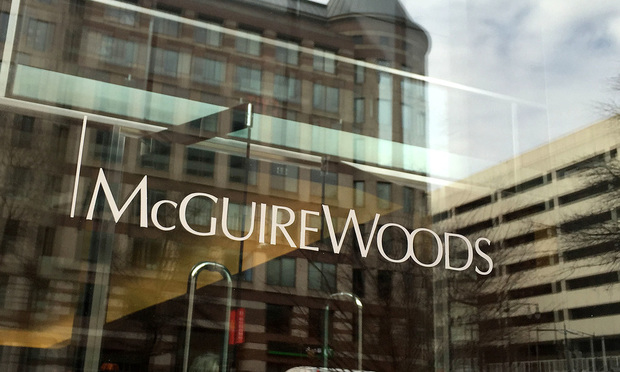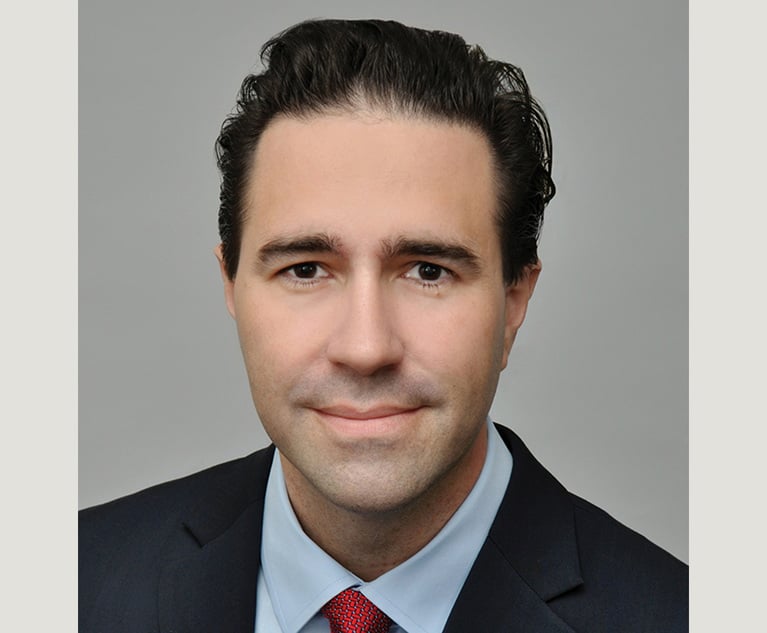McGuireWoods Picks up Environmental Trio From Hunton Andrews Kurth
Partners Makram Jaber, Allison Wood and Aaron Flynn bring a range of experience in high-stakes environmental regulatory matters.
April 01, 2020 at 05:44 PM
3 minute read
 McGuireWoods offices in Washington, D.C. (Photo by Diego M. Radzinschi/ALM)
McGuireWoods offices in Washington, D.C. (Photo by Diego M. Radzinschi/ALM)
McGuireWoods is shoring up its environmental practice in the capital, bringing on three new partners Wednesday who have experience taming regulators and litigating environmental matters up to the U.S. Supreme Court level.
Makram Jaber, Allison Wood and Aaron Flynn are joining as partners in Washington, D.C., where they'll contribute to the firm's regulatory and compliance department and energy enforcement practices. The trio join from Hunton Andrews Kurth, where Jaber and Wood had practiced together since 1999 and Flynn had been since 2007.
"This group fits well into a number of elements of the firm's strategic business planning, where we were hoping to grow certain sectors and elements in different geographies—including energy and regulatory as well as complex, government-oriented litigation in Washington, D.C.," said Todd Mullins, managing partner of McGuireWoods' D.C. office.
While environmental regulatory and enforcement litigators are always in relatively steady demand, the group's move comes as many large law firms are reacting to climate change by expanding their environmental practice groups to include climate-specific work.
Wood said that conversations with the group's existing clients have been positive and that at least some of them would make the move from Hunton Andrews Kurth to McGuireWoods. She advises on climate change issues and environmental matters and has represented clients on every major case involving greenhouse gas regulation under the Clean Air Act, according to her new firm, including Massachusetts v. EPA, Utility Air Regulatory Group v. EPA and American Electric Power Co. v. Connecticut.
Jaber represents power companies, manufacturers, oil and gas companies and other clients and advises on regulation of hazardous air pollutants and new source permitting, counseling and enforcement. He litigated Environmental Defense v. Duke Energy in the U.S. Supreme Court and was lead counsel in a Tenth Circuit case involving the Clean Air and Endangered Species acts.
Flynn works on environmental litigation and regulatory matters with a focus on regional haze and national ambient air quality standards. Prior to private practice, he was counsel for the White House Office of Science and Technology Policy under President George W. Bush and worked on issues relating to the National Environmental Policy Act, the Clean Water Act and the Endangered Species Act. Now, he prepares comments on Clean Air Act rules, designs and obtains permits and has litigated cases in federal courts of appeals.
"This is an exciting opportunity to come here and grow an environmental practice, as people start to rethink energy and how that intersects with being greener," Wood said. "My job is to help clients achieve what they need and want—sometimes that's making sure they're in compliance with existing regulations and law, and sometime's its being more forward-thinking and helping energy companies address climate change in a way that makes sense for society, the business and how that intersects with the government."
Wood added that, even as some conversations with clients have centered on how the coronavirus pandemic might affect them, issues in the environmental space are continuing mostly as usual, and she anticipates various EPA regulations—including proposals on national ambient air quality standards, a reconsideration of a rule on methane and new source performance standards in the electric utility sectors—to continue moving through the pipeline.
"You still need to be in compliance with environmental regulations, and you still need to keep folks' lights on," she said.
This content has been archived. It is available through our partners, LexisNexis® and Bloomberg Law.
To view this content, please continue to their sites.
Not a Lexis Subscriber?
Subscribe Now
Not a Bloomberg Law Subscriber?
Subscribe Now
NOT FOR REPRINT
© 2025 ALM Global, LLC, All Rights Reserved. Request academic re-use from www.copyright.com. All other uses, submit a request to [email protected]. For more information visit Asset & Logo Licensing.
You Might Like
View All

O'Melveny, White & Case, Skadden Beef Up in Texas With Energy, Real Estate Lateral Partner Hires
5 minute read
Bill Would Allow Californians to Sue Big Oil for Climate-Linked Wildfires, Floods
3 minute read
Supreme Court Denies Oil Giants' Appeal to End State Climate Suits
Law Firms Mentioned
Trending Stories
- 1Trump Administration Faces Lawsuit Over USAID Stop-Work Orders
- 2Legaltech Rundown: Davis Wright Tremaine Announces CodeX Partnership, AAA Brings on Maya Markovich as VP, and More
- 3State Appellate Court Settles Fee Battle Between Former Co-Counsel in Patent Litigation
- 4Recent Controversial Decision and Insurance Law May Mitigate Exposure for Companies Subject to False Claims Act Lawsuits
- 5Visa Revocation and Removal: Can the New Administration Remove Foreign Nationals for Past Advocacy?
Who Got The Work
J. Brugh Lower of Gibbons has entered an appearance for industrial equipment supplier Devco Corporation in a pending trademark infringement lawsuit. The suit, accusing the defendant of selling knock-off Graco products, was filed Dec. 18 in New Jersey District Court by Rivkin Radler on behalf of Graco Inc. and Graco Minnesota. The case, assigned to U.S. District Judge Zahid N. Quraishi, is 3:24-cv-11294, Graco Inc. et al v. Devco Corporation.
Who Got The Work
Rebecca Maller-Stein and Kent A. Yalowitz of Arnold & Porter Kaye Scholer have entered their appearances for Hanaco Venture Capital and its executives, Lior Prosor and David Frankel, in a pending securities lawsuit. The action, filed on Dec. 24 in New York Southern District Court by Zell, Aron & Co. on behalf of Goldeneye Advisors, accuses the defendants of negligently and fraudulently managing the plaintiff's $1 million investment. The case, assigned to U.S. District Judge Vernon S. Broderick, is 1:24-cv-09918, Goldeneye Advisors, LLC v. Hanaco Venture Capital, Ltd. et al.
Who Got The Work
Attorneys from A&O Shearman has stepped in as defense counsel for Toronto-Dominion Bank and other defendants in a pending securities class action. The suit, filed Dec. 11 in New York Southern District Court by Bleichmar Fonti & Auld, accuses the defendants of concealing the bank's 'pervasive' deficiencies in regards to its compliance with the Bank Secrecy Act and the quality of its anti-money laundering controls. The case, assigned to U.S. District Judge Arun Subramanian, is 1:24-cv-09445, Gonzalez v. The Toronto-Dominion Bank et al.
Who Got The Work
Crown Castle International, a Pennsylvania company providing shared communications infrastructure, has turned to Luke D. Wolf of Gordon Rees Scully Mansukhani to fend off a pending breach-of-contract lawsuit. The court action, filed Nov. 25 in Michigan Eastern District Court by Hooper Hathaway PC on behalf of The Town Residences LLC, accuses Crown Castle of failing to transfer approximately $30,000 in utility payments from T-Mobile in breach of a roof-top lease and assignment agreement. The case, assigned to U.S. District Judge Susan K. Declercq, is 2:24-cv-13131, The Town Residences LLC v. T-Mobile US, Inc. et al.
Who Got The Work
Wilfred P. Coronato and Daniel M. Schwartz of McCarter & English have stepped in as defense counsel to Electrolux Home Products Inc. in a pending product liability lawsuit. The court action, filed Nov. 26 in New York Eastern District Court by Poulos Lopiccolo PC and Nagel Rice LLP on behalf of David Stern, alleges that the defendant's refrigerators’ drawers and shelving repeatedly break and fall apart within months after purchase. The case, assigned to U.S. District Judge Joan M. Azrack, is 2:24-cv-08204, Stern v. Electrolux Home Products, Inc.
Featured Firms
Law Offices of Gary Martin Hays & Associates, P.C.
(470) 294-1674
Law Offices of Mark E. Salomone
(857) 444-6468
Smith & Hassler
(713) 739-1250








